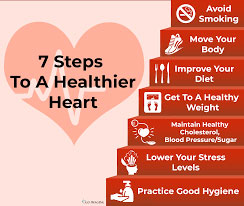HERE ARE THE TOP QUESTIONS TO ASK YOUR DOCTOR TO GET BACK ON TRACK
The high number of U.S. adults that have delayed or avoided medical care during the pandemic has led to adverse health outcomes, including increased risk for heart disease and stroke, and the latest data shows that cardiovascular disease is trending in the wrong direction. After the first year of the pandemic, there was a rise in heart disease and stroke-related deaths and declines in physical activity.
As the end of the year quicky approaches, many Americans may be thinking about how they can get their health back on track – such as getting back to the doctor and making new year’s resolutions.
Based on age and health status, there are many factors that Americans should be considering when talking to their doctor, especially when it comes to heart disease and stroke. It’s important for people to ask their doctor the right questions, including what healthy blood sugar, blood pressure and cholesterol levels are, and how they can check those levels at home. It’s also a good time to check with a doctor on small steps they can take, like activity and diet, to live a heart healthy lifestyle.
Heart disease is the number one cause of death for Black adults in the US. As with too many other issues, Black adults are disproportionately impacted – rates of premature heart disease are 87% higher for Black adults than white adults. CDC Foundation has launched a new national campaign to encourage adults to make heart health a priority—reminding them they can get to it in small steps. The “Start Small. Live Big,” effort focuses specifically on older adults (51% of adults with cardiovascular disease are age 60 or over, according to the American Heart Association).
The campaign encourages adults to get back on track with the small steps—like scheduling their medical appointments, getting active and eating healthy—so that they can get back to living big.
The CDC Foundation collaborated with CDC’s Million Hearts® Initiative to develop the campaign, designed to support CDC’s goal of preventing one million heart attacks, strokes, and cardiovascular events.
Dr. Larry Sperling, cardiologist and executive director of the CDC Million Hearts initiative, Americans should ask their doctors at end-of-year visits to help get their health back on track.
LAURENCE S. SPERLING, M.D., FACC, FAHA, FACP, FASPC-BIOGRAPHICAL INFORMATION
Laurence S. Sperling, M.D., FACC, FAHA, FACP, FASPC is the current Executive Director of the Million Hearts Initiative for the Division of Heart Disease and Stroke Prevention at the Centers for Disease Control and Prevention and the Center for Medicare and Medicaid Services. He is the Founder and was the Director of The Heart Disease Prevention Center at Emory since 1997. He is currently the Katz Professor in Preventive Cardiology at the Emory University School of Medicine, and Professor of Global Health in the Rollins School of Public Health. He served as the President of the American Society for Preventive Cardiology from 2014-2016, served on the writing committee of 2018 the ACC/ AHA Guideline on the Management on Blood Cholesterol, and served as Chair of the World Heart Federation writing group on the Roadmap for Cardiovascular Disease Prevention among People Living with Diabetes. Dr. Sperling was the recipient of the 2017 Award of Honor from the Alumni Association of Emory University School of Medicine. He has received awards for excellence in teaching (including 4 Golden Apple Awards and The Dean’s Teaching Award), mentorship (Emory SOM 2018 Mentorship Award), and the R. Wayne Alexander Research mentor award. He has authored over 350 manuscripts/ abstracts/ books, and has been an invited speaker on every continent except Antarctica.
Interview courtesy: CDC Foundation
#larry #sperling #heart #doctor #pandemic #health #steps #medical #care #disease #stress #attack #stroke #cdc #americans #blood #pressure #cholesterol #sugar #death



 Kayla Peale, a Strawless Sea? Amazon.com, Inc.
Kayla Peale, a Strawless Sea? Amazon.com, Inc.